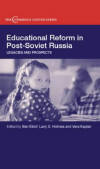 EDUCATIONAL
REFORM IN POST-SOVIET RUSSIA: LEGACIES AND PROSPECTS EDUCATIONAL
REFORM IN POST-SOVIET RUSSIA: LEGACIES AND PROSPECTS
Edited by Ben Eklof, Larry E. Holmes and Vera Kaplan
This
volume consists of a collection of essays devoted to study of the most recent
educational reform in Russia. Large-scale changes have been effected in finance,
structure, governance and curricula. At the same time, there has been a renewed
and widespread appreciation for the positive aspects of the Soviet legacy in
schooling. The essays presented here compare current educational reform to
reforms of the past, analyze it in a broader cultural, political and social
context, and study the shifts that have occurred at the different levels of
schooling from political decision-making and changes in school administration
to the rewriting textbooks and teachers' everyday problems. The authors are
Russian educators, who have played a leading role in implementation of the
reform, and Western scholars, who have been studying it from its very early
stages. Together, they formulate an intricate but cohesive picture, which is in
keeping with the complex nature of the reform itself.
Contributors: Kara Brown,
(Indiana University) * Ben Eklof (Indiana University) * Isak D. Froumin, (World
Bank, Moscow) * Larry E. Holmes (University of South Alabama) * Igor Ionov,
(Russian History Institute of the Russian Academy of Sciences) * Viacheslav
Karpov & Elena Lisovskaya, (Western Michigan University) * Vera Kaplan, (Tel
Aviv University) * Stephen T. Kerr, (University of Washington) * James Muckle,
(University of Nottingham) * Nadya Peterson, (Hunter College) * Scott Seregny,
(Indiana University-Purdue University Indianapolis) * Alexander Shevyrev,
(Moscow State University) * Janet G. Vaillant, (Harvard University)
Ben Eklof is Professor of History and Education at Indiana University and editor
of Khronika: Chronicle of Education in Russia and Eurasia. Among his
books are Russian Peasant Schools (1986), Soviet Briefing (1989),
School and Society in Tsarist and Soviet Russia (ed., 1993), Democracy
in the Russian School (ed., 1993),
Russia’s Great Reforms,
1855-1881 (ed.,
1994), The World of the Russian Peasant (ed., 1990). Recently, he edited
the two volume English language translation of Boris Mironov’s acclaimed
Social History of Imperial
Russia,
1700-1917. Prof.
Eklof continues to work on a volume on the daily life of the Russian school
before the Revolution, and to publish on education in the post-Soviet era.
Larry E. Holmes is Professor of History at the University of South Alabama.
During the 1992/93 academic year he lectured in Russian and Soviet history at
Rostov State University. His publications include: The Kremlin and the
Schoolhouse: Reforming Education in Soviet
Russia, 1917-1931
(1991); Sotsial’naia istoriia Rossii: 1917-1941 (1994); and Stalin’s
School: Moscow’s
Model School No. 25, 1931-1937
(1999). A book, Grand Theater: The Administration of Schools in the
Russian Republic,
1931-1941, is under
preparation.
Vera Kaplan
is a research associate at the Cummings Center for Russian and
East European Studies, Tel Aviv University.
She currently coordinates a research project on ‘The Teaching of History and
Formation of New Historical Narratives in Post-Soviet Russia’. She has authored
a number of scholarly papers on the history of Russian education, as well as on
educational policy and history teaching in contemporary Russia and co-edited a
volume entitled, The Teaching of History in Contemporary Russia: Trends and
Perspectives (Tel Aviv, 1999). Alongside her research work, Dr. Kaplan
teaches courses on modern Russian history at the Department of History, Tel Aviv
University.
Contents
Preface
1. Introduction:
Ben Eklof
I: Educational Policy: Past and Present
2. Educational Change in
Time of Social Revolution: The Case of Post-Communist Russia in Comparative
Perspective
Viacheslav Karpov and Elena
Lisovskaya
3. School and Schooling under
Stalin, 1931_1953
Larry E. Holmes
4. The Experimental
Tradition in Russian Education
Stephen T. Kerr
5.
Democratic Educational Reform in
Russia:
Achievements and Setbacks
Isak D. Froumin
6.
Demographic Change and the Fate of Russia’s School’s: The Impact of Population
Shifts on Educational Practice and Policy
Stephen T. Kerr
7. The Education of
Russian-Speakers in Estonia
Kara D. Brown
II:
The Teacher, the Textbook and Educational Practice
8. Teachers
in Post-Soviet Russia: The Past in the Present
Ben Eklof and Scott Seregny
9. Civic Education in a
Changing Russia
Janet G. Vaillant
10. History Teaching in
Post-Soviet Russia: Coping with Antithetical Traditions
Vera Kaplan
11. Re-writing the National
Past: New Image of Russia in History Textbooks of the 1990s
Alexander Shevyrev
12. New Trends in Historical
Scholarship and the Teaching of History in Russia’s School
Igor’ Ionov
13. Teaching Literature in the
New Russian School
Nadya Peterson
14. The Conduct of Lessons in
the Russian School: Is Real Change on the Way?
James Muckle
Notes on Contributors
Glossary
Appendices
Index
|
350 pages |
2005
| |
0 7146 57050
|
cloth
|
£65
| |
|
|
|
|
